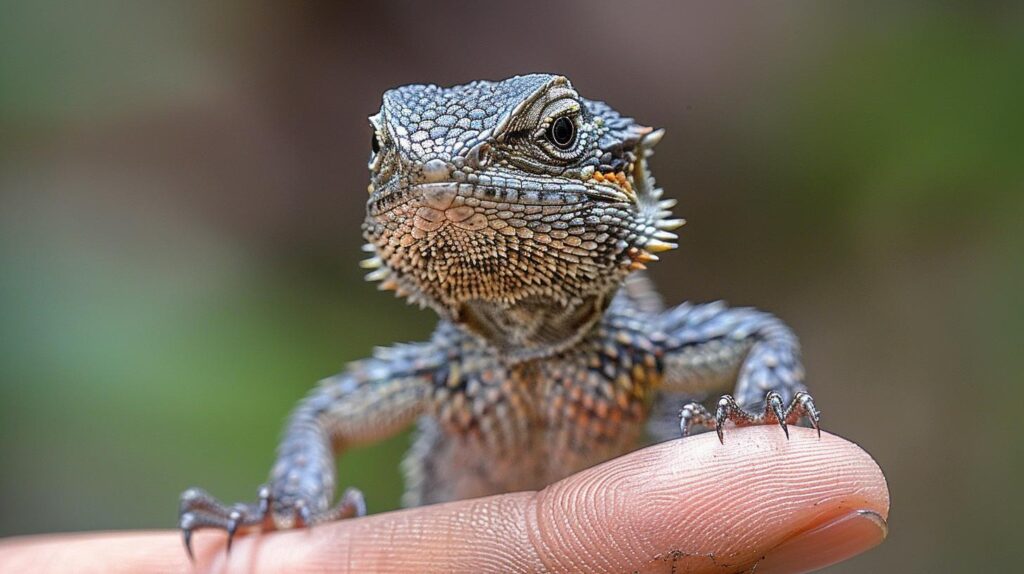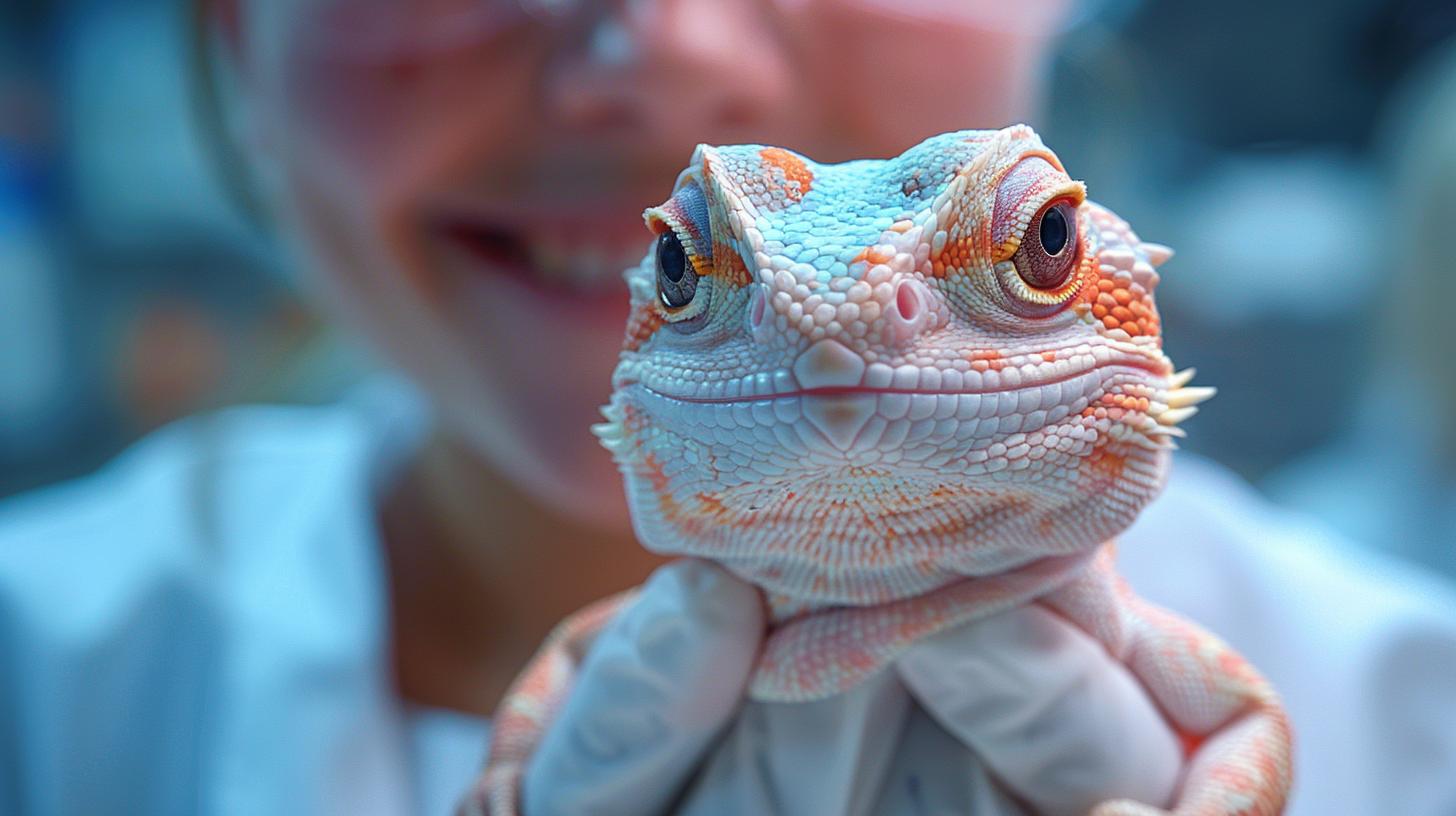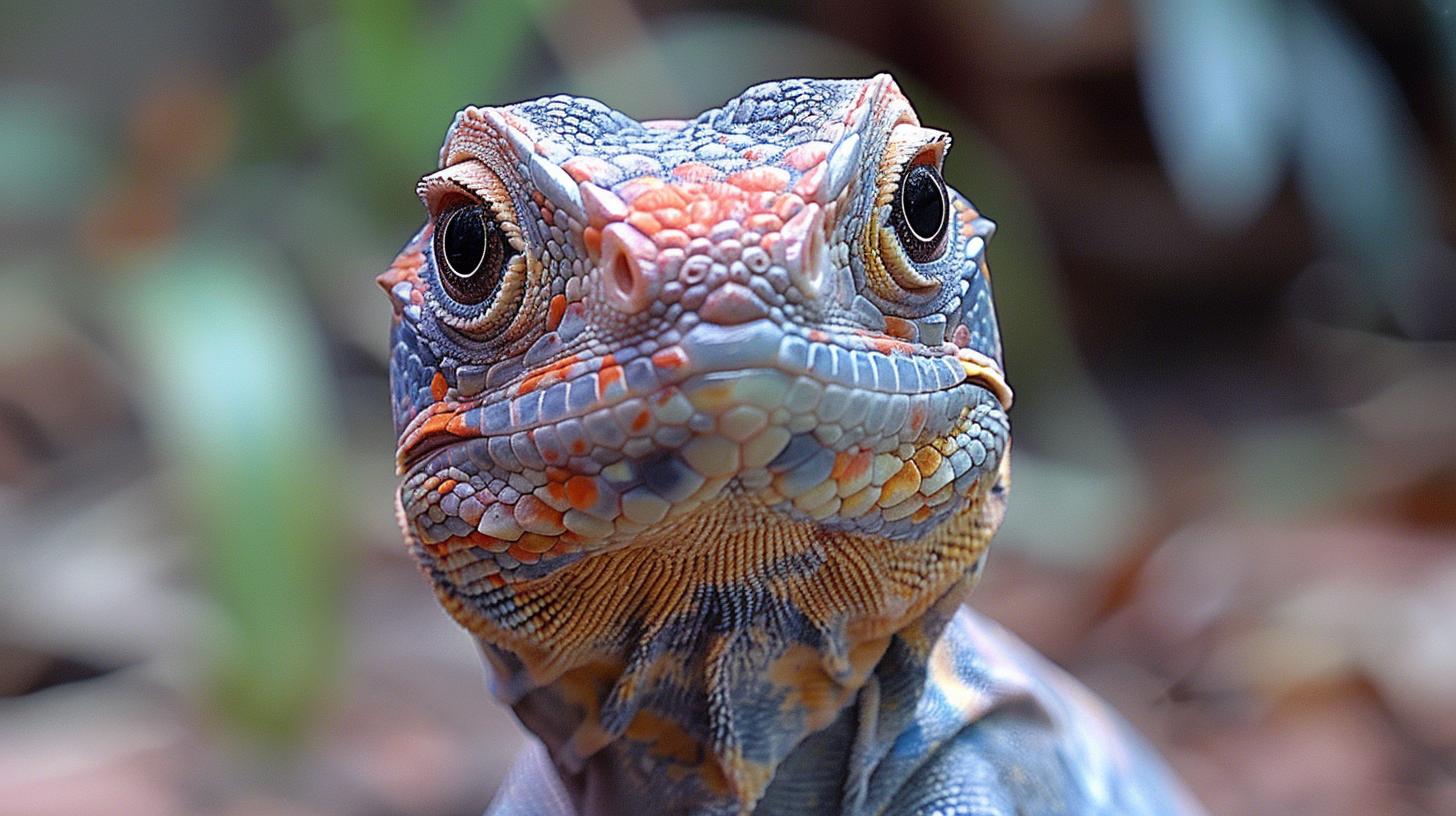How Often Your Lizard Needs a Vet Check-Up

- Understanding the Importance of Regular Vet Visits for Lizards
- The Frequency of Vet Visits Explained
- Preparing for Your Lizard's Vet Check-Up
- Common Health Issues in Lizards and Their Symptoms
- How a Vet Examines Your Lizard
- Post-Check-Up Care and Recommendations
- Building a Relationship With Your Reptile Vet
Understanding the Importance of Regular Vet Visits for Lizards
Scheduling a lizard vet check-up might not be the first thing on a pet owner's mind, but it's an essential part of ensuring your scaly companion enjoys a long, healthy life. Reptiles like lizards have unique health needs that differ significantly from more common pets such as dogs and cats. Understanding why these regular veterinarian visits are crucial can equip you with the knowledge to better care for your cold-blooded friend.
Lizards conceal signs of illness well, making it challenging to recognize when they're unwell until potentially serious symptoms arise. This innate behavior is why regular health check-ups by a reptile-knowledgeable vet are indispensable. These visits provide an opportunity for early detection of issues that could become major if left unchecked. By committing to routine assessments, owners can ensure their lizard's specific dietary, environmental, and medical requirements are consistently met, contributing significantly to their well-being.
Moreover, the frequency of these vet visits carries its own set of guidelines. While an annual health assessment is generally recommended for most lizard species, circumstances such as noticeable changes in behavior or physical appearance may necessitate additional consultations.
Stressful situations like shedding difficulties, lethargy, or sudden weight changes are clear indicators your lizard might need expert medical attention sooner rather than later. Understanding and adhering to these recommendations play a vital role in preventing or managing health issues that are common among lizards.
Preparing for your reptile's vet visit involves more than just marking a date on the calendar; it requires thoughtful planning to minimize stress for both you and your pet. Gathering prior health records, noting any behavioral changes since the last visit, and ensuring your lizard is safely transported are all steps that contribute towards an effective check-up process.
Engaging in this level of preparation not only aids in diagnosing potential ailments but also fosters a stronger bond between you and your pet as you learn more about their needs and how best to meet them.
The Frequency of Vet Visits Explained
Navigating the healthcare needs of a pet lizard involves understanding the critical role that regular veterinary visits play in their well-being. Just like any other pet, lizards require professional medical attention to identify and treat potential health issues, ensuring they enjoy a long and healthy life.
This maintenance of health is not merely about responding to illnesses as they arise but also about preventing them through continuous monitoring and care. In this context, identifying the optimal frequency of vet visits emerges as a cornerstone of proactive reptile healthcare management.
Reptiles, including lizards, often mask signs of illness until it becomes too severe to hide. This behavior makes regular check-ups an indispensable part of their care routine.
A visit to a vet who specializes in reptiles can catch subtle changes in health that might not be noticeable even to an observant lizard owner. During these appointments, the veterinarian not only assesses the current state of your lizard's health but also offers valuable advice on nutrition, habitat setup, and other husbandry practices that could enhance your pet's quality of life.
Annual Health Assessments
The cornerstone of lizard healthcare is the annual health assessment. This yearly check-up is crucial for all types of lizards regardless of age or species.
It provides a benchmark for monitoring changes in your pet's health over time and allows vets to administer necessary preventive care measures such as parasite control. These annual visits are also the perfect opportunity for owners to discuss any concerns with their vet and gain insights into advanced care strategies tailored specifically for their pet.
When Additional Vet Visits Are Necessary
Besides the essential yearly examination, there may be instances requiring more frequent consultations with your lizard vet check-up Notable changes in behavior or appearance - such as reduced appetite, lethargy, skin discoloration, or unusual fecal matter - warrant immediate medical attention.
Early intervention in such cases can be pivotal in managing potential health issues effectively before they escalate into more serious conditions. Throughout this period, maintaining clear communication with your veterinarian ensures your lizard receives timely treatment and continues to thrive under your care.
Understanding when to seek additional vet consultations plays a significant role in protecting your lizard from enduring preventable ailments or diseases. Through adherence to recommended annual check-ups and staying vigilant for signs necessitating more frequent visits, lizard owners can significantly contribute to their pet's longevity and well-being. This proactive approach towards healthcare scheduling aligns with best practices in reptile management, reinforcing the importance of establishing a regular pattern of veterinary visits throughout your lizard's life.
Preparing for Your Lizard's Vet Check-Up
Before taking your pet to a lizard vet check-up, ensuring you're fully prepared is essential for both you and your lizard's ease. This preparation not only helps minimize the stress experienced by your pet but also maximizes the efficiency of the visit, allowing the veterinarian to conduct a thorough assessment. The aim is to make the visit as smooth and productive as possible, focusing on your lizard's health needs.
Understanding what to expect and how to prepare can significantly affect the outcome of your visit. A well-prepared owner contributes vastly to a successful veterinary examination. This section will navigate through necessary preparations, vital items to bring along, and tips on reducing stress for your lizard during its journey and stay at the clinic.

Gathering Essential Documents
Start by collecting any relevant medical records, including previous vet visits, health issues, or treatments your lizard has undergone. These documents are invaluable as they provide a historical health perspective that aids in diagnosing current conditions or assessing overall health trends. Also, note down any specific behaviors or symptoms observed that prompted this check-up; these firsthand observations can be crucial clues for the vet.
Packing Necessary Items
When preparing for a trip to see a reptile-savvy veterinarian, packing essential items is crucial for ensuring your lizard's comfort and safety. Ensure you have a suitable carrier-preferably one designed for reptiles-that ensures adequate ventilation without allowing significant temperature changes that could stress your pet. Including familiar items from its habitat (like a favorite hideout or cloth) can also help soothe your lizard during transit.
Minimizing Stress Factors
The experience of visiting a vet can be stressful for lizards due to changes in their environment and routine disruptions. To mitigate this stress, acclimatize your pet to its carrier days before the appointment.
Introduce it as an inviting space by placing treats inside it or feeding them near it so they associate it with positive experiences. On the day of the check-up, maintain as much normalcy in their routine as possible before transitioning them into their carrier smoothly and calmly.
Through thoughtful preparation and attention to detail, you can play a pivotal role in ensuring that your lizard's vet check-up goes smoothly. Addressing both logistical needs and emotional comfort will help create a more positive experience for you and your scaly companion, enabling effective healthcare delivery by professionals attuned to reptile care nuances.
Common Health Issues in Lizards and Their Symptoms
Identifying common health issues in lizards is a fundamental step toward ensuring their well-being. Early detection of symptoms can lead to prompt treatment, significantly improving the chances of a full recovery. One reason why regular lizard vet check-ups are indispensable is because they allow professionals to diagnose and manage conditions that may not be evident to most owners.
Among the prevalent health concerns for these reptiles are metabolic bone disease (MBD), respiratory infections, and parasitic infestations. MBD results from inadequate calcium, vitamin D3, or phosphorus, leading to weakened bones. Symptoms include *lethargy*, *deformed bones*, and difficulty moving. Respiratory infections, signaled by wheezing, difficulty breathing, or nasal discharge, often stem from improper humidity levels. Parasites-internal like worms or external like mites-can cause weight loss, decreased appetite, or visible irritation on the skin.
Preparing for a lizard vet check-up entails observing your pet closely for any of these symptoms. Documenting your observations could greatly aid your vet during the examination process:
- Lethargy: Noticing decreased activity levels compared to normal behavior.
- Appetite changes: Significant increases or decreases in food consumption.
- Physical abnormalities: Swelling, deformities in bone structure, unusual spots or marks on the skin.
- Behavioral shifts: Increased aggression or fearfulness that deviates from their standard demeanor.
Understanding these signs is crucial for lizard owners as it ensures timely medical intervention when necessary. However, this should not replace professional healthcare advises but rather complement it by allowing veterinarians to have a clearer picture of the problem at hand during a check-up.
While addressing these common health issues is vital, prevention plays an even more significant role in maintaining your lizard's health. A balanced diet tailored to their species-specific needs, proper habitat setup with appropriate temperature and humidity levels-all contribute to preventing many of the illnesses mentioned above. Yet despite taking all possible precautions, visiting a reptile-savvy veterinarian regularly remains an essential part of caring for your pet lizard.
By incorporating this knowledge into their care routine and making timely visits to a qualified veterinarian for a lizard vet check-up, owners can play a proactive role in safeguarding their lizard's health against common issues while also being prepared to act swiftly should any worrying symptoms arise. This approach not only ensures optimal reptile health but also fosters a deeper understanding and connection between lizards and their caretakers.
How a Vet Examines Your Lizard
When it comes time for your lizard's vet check-up, knowing what to expect can alleviate much of the stress associated with these visits. Understanding the examination process can also help you prepare any questions or concerns you might want to discuss with your vet. A *lizard vet check-up* typically focuses on assessing overall health, identifying any signs of illness or distress, and recommending preventive care measures.
The examination begins with a detailed review of your lizard's history and a discussion about its diet, habitat conditions, and behavior patterns. This conversation is critical as it offers clues about potential health issues that might not be immediately evident. Vets who specialize in reptile care are skilled at interpreting these details to ensure your pet receives comprehensive care.

During the physical exam, the vet will meticulously check your lizard's:
- Skin: For signs of infections or parasites
- Eyes, Mouth, and Nose: To detect any abnormalities
- Limbs and Tail: Checking for injuries or signs of metabolic bone disease
- Weight and Length Measurements: To monitor growth and identify sudden changes
Moreover, a fecal test may be conducted to look for internal parasites, which are common in lizards. In some cases, if more severe issues are suspected, imaging tests like X-rays might be recommended to get a clearer picture of your lizard's internal health. These procedures aim to diagnose any ailments early on when they're usually easier to treat.
Beyond the physical examination and diagnostic tests, the *lizard vet check-up* is an opportunity for vets to offer personalized advice on nutrition, habitat setup, UV light provision, and other essential aspects of reptile care based on their findings. They can educate owners on best practices for maintaining a healthy environment that mimics natural surroundings as closely as possible.
This segment of veterinary care is not only about identifying current problems but preventing future ones. That's why regular visits are encouraged; they enable early detection and management of health issues before they escalate into more serious conditions.
Following this examination overview prepares both you and your lizard for what comes next: implementing any necessary treatments or adjustments in care routines to ensure optimal health. Understanding this process demystifies what happens during a trip to the vet and underscores its importance in proactive reptile healthcare management.
Post-Check-Up Care and Recommendations
After a thorough lizard vet check-up, pet owners receive critical guidance on caring for their reptiles. It's essential to closely follow the veterinarian's recommendations, which might include changes in diet, administration of medications, or modifications in habitat conditions. The goal of these post-check-up instructions is not just to address any immediate health concerns but also to ensure long-term well-being for your lizard.
| Recommendation Type | Benefits |
|---|---|
| Dietary Adjustments | Addresses nutritional deficiencies and supports overall health. |
| Medication Administration | Treats existing conditions and prevents potential health issues. |
| Habitat Modifications | Creates an environment that mimics natural habitats closely, reducing stress and promoting healthy behaviors. |
Implementing these suggestions can sometimes pose challenges, especially for new lizard owners. However, remember that consistency is key. A gradual introduction of dietary changes or a step-by-step approach to modifying the enclosure can make the transition smoother for both you and your pet. Moreover, stay observant for any signs of distress or discomfort that may indicate an adjustment isn't sitting well with your lizard.
Most importantly, keep communication lines open with your veterinarian. If you encounter difficulties in following through with their advice or notice adverse effects from treatments, it's crucial to reach out promptly. Your vet can provide alternative solutions or adjustments based on your observations and feedback. This collaborative approach ensures that your lizard not only recovers from any present ailments but also thrives under your care.
Proceeding from the detailed examination during the *lizard vet check-up*, implementing post-check-up care recommendations effectively contributes significantly to nurturing a healthy and vibrant pet lizard. As we progress further into understanding the nuances of reptile healthcare and management, it becomes increasingly clear how pivotal each step-before, during, and after veterinary visits-is in shaping the quality of life for these unique creatures.
Building a Relationship With Your Reptile Vet
As we conclude our informative journey on the health and wellbeing of lizards, it becomes clear that understanding the necessity of regular vet check-ups is paramount. These visits embody more than just routine procedures; they are a proactive approach to safeguarding the vitality of your cherished reptile.
The guidance provided throughout outlines a roadmap for nurturing a vibrant, healthy life for your pet lizard, from recognizing the signs of common health issues to the nuances of preparing for a vet visit. This comprehensive exploration underscores how indispensable knowledgeable care is - punctuated by the critical importance of establishing and maintaining a robust relationship with a reptile-savvy veterinarian.
Maintaining your lizard's health through regular check-ups, including those essential lizard vet check-up appointments, stands at the core of responsible pet ownership. Each section has illuminated not only how often these visits should occur but also what they entail and why they're crucial for spotting potential health issues before they become serious problems.
Equally important is the trust and familiarity built over time with your veterinarian, which can significantly impact the efficiency and effectiveness of diagnosis and treatment. It's this partnership between you and your reptile vet that forms the cornerstone of achieving the highest standard of care for your pet.
We invite you to continue enriching your knowledge about pet care by navigating through our website's vast collection of articles. Whether you're seeking advice on another aspect of lizard care or exploring information on a wide array of pets, our site is dedicated to providing valuable insights designed to support you in offering the best possible life for your animal companion.
Embark on this continuous learning journey with us; together, let's ensure our pets lead long, happy, and healthy lives.
Leave a Reply
You must be logged in to post a comment.